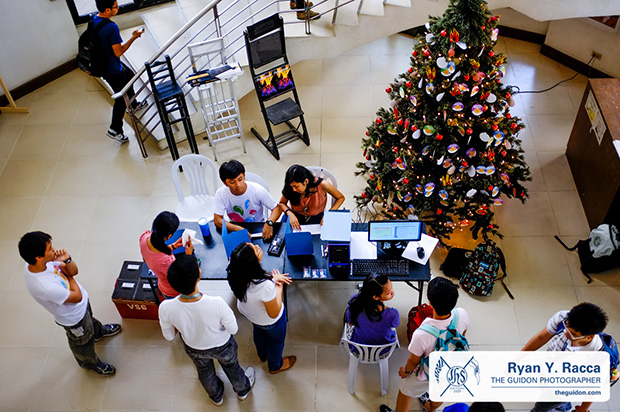
SHORT OF TARGET. The mock poll on senatoriables did not reach its quota of 380 students. Photo by Ryan Y. Racca.
OF THE roughly 8,000 students that constitute the Ateneo undergraduate student population, only around 250 voted in the Ateneo mock elections held last December 17 to 19, 2012.
Entitled “Pulso Azul,” the mock elections aimed to determine the senatorial candidates Ateneans want to vote for in the upcoming May 2013 elections. It also aimed to identify the issues the student body wants future senators to concern themselves with.
Pulso Azul is a collaborative project between the Ateneo Task Force (ATF) 2013 and the Ateneo Commission on Elections (Comelec).
Mock Elections Head Ray Lacsamana said that the results of this school year’s mock elections were more or less the same as the last mock elections back in 2010 in terms of the number of voters.
“The plan is to have a good number, around 380 [voters],” he said. However, even though they have mobilized a number of students, it was not enough to meet the said targeted number. Contributing to this was the fact that there were votes that could not be counted due to lacking information that rendered the ballot void.
Nevertheless, Lacsamana commented, “At least, we released a certain degree of awareness to the Atenean population.”
The project is the third phase of ATF’s projects for this school year, with the first phase being “Hakot Registration” and the second being “Voters’ Education.”
Better scheduling, more aggressive promotions
According to Lacsamana, one of the reasons why the mock elections failed to get a “good number” of votes is that it was scheduled during the midterm examinations week.
“Our schedule was actually very tight,” he said. “[Students] also had to go back to their respective provinces and areas [for the Christmas break].”
He added, “So the problem was we didn’t have enough voters because voters weren’t in the proper voting mood.”
Lacsamana also said that the Comelec at that time had a tight schedule that affected the scheduling of the elections, but did not explain further.
ATF 2013 Head Ian Agatep said that there are also points for improvement in terms of promotions.
“What I can really recommend is do the promotions earlier through hype,” said Agatep.
“Social media campaign of sorts could have helped aside from simply word-of-mouth, posters [and] traditional ways of promotions,” he added.
Freshman Johannes Unana recommended that the ATF highlight the significance of the mock elections to urge students to vote.
“Ano naman kung may ganito? Iyong tipong bakit ko kailangan magbigay ng oras para dito (What is it to me if there’s an event like this? Why do I have to give time for this)?” posed Unana.
Unana also suggested that the people manning the voting booths explain why it is necessary to vote, or to abstain rather than to not vote at all.
“Sana ma-promote na bilang isang estudyante at bilang parte ng isang democratic country, karapatan natin bumoto at dapat hindi natin ito sinasayang. (I hope it gets promoted that as a student, and as a citizen of a democratic country, it is our right to vote and we shouldn’t waste this right.),” Unana added.
On the bright side
Pulso Azul, however, was still able to reveal the voting preferences of the students.
Agatep said that they are satisfied with how the votes turned out, even though it could have been much better.
“We still got the numbers that we needed, the numbers that would hopefully show which senators are the ones voted, which issues are the ones sought,” he said.
“It was a nice ballot, it was a nice system, it was a good help from Comelec and we’re thankful for that.”
Agatep said that while they hoped for a better voter turnout, it was all they could do in a three-day mock poll.
“So whatever comes out in the result with around 200 plus students who were able to vote, we’re hoping to get the percentage and see what the pulse is for these students who actually care,” he said.
Unana nevertheless said that the mock elections were a good way for Ateneans to be aware of national issues.
“Okay siya kasi na-o-open iyong Atenista sa gobyerno natin kasi pag naging parte na tayo ng work force, hindi pwedeng wala tayong pakialam. (It was okay because in a way, Ateneans are introduced to matters of government, and when we become part of the work force, we cannot be apathetic.),” he said.
Unana is also thankful that Ateneans who are not yet at the right age to vote were given the chance to have a say through the mock elections.






